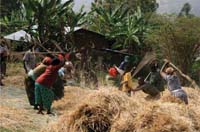Concepts of community mobilisation
To mobilise is to get something or someone on the move. It follows then that community mobilisation is about organising the community and all the resources available in the community to move them towards achieving a certain health programme goal. Having this concept in mind, community mobilisation is defined as a capacity building process, through which individuals, groups and families (such as model families), as well as organisations, plan, carry out and evaluate activities on a participatory and sustained basis to achieve an agreed goal (Figure 19.2). This might be from their own initiative — or a goal stimulated by others.

Community-based participatory approaches to community mobilisation will help to achieve reliable and sustainable healthy lifestyles and behavioural changes. Through community involvement, lay and professional people study health problems, pool their knowledge and experience, and develop ways and means of solving their health problems. Your role is to help the community organise itself so that learning will take place and action follows. The health activity cannot achieve the intended goals without involving the community. This can only be achieved by building on the community's knowledge and beliefs through a continuous dialogue, and not by dictating to them what they should do.
A community should be mobilised and technically supported to take action to identify their own health issues or problems if essential health care is to be made available to every household in Ethiopia.